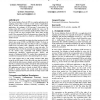Free Online Productivity Tools
i2Speak
i2Symbol
i2OCR
iTex2Img
iWeb2Print
iWeb2Shot
i2Type
iPdf2Split
iPdf2Merge
i2Bopomofo
i2Arabic
i2Style
i2Image
i2PDF
iLatex2Rtf
Sci2ools
126
click to vote
WMASH
2005
ACM
2005
ACM
Measurements of SIP signaling over 802.11b links
The Session Initiation Protocol (SIP) is a popular application-level signaling protocol that is used for a wide variety of applications such as session control and mobility handling. In some of these applications, the exchange of SIP messages is time-critical, for instance when SIP is used to handle mobility for voice over IP sessions. SIP may however introduce significant delays when it runs on top of UDP over lossy (wireless) links. These delays are the result of the exponential back-off retransmission scheme that SIP uses to recover from packet loss, which has a default back-off time of half a second. In this paper, we empirically investigate the delay introduced by SIP when it runs on top of UDP over IEEE 802.11b links. We focus on the operation of SIP at the edge of an 802.11b cell (e.g., to update a mobile host’s IP address after a handoff) as this is where SIP’s retransmissions scheme is most likely to come into play. We experiment with a few 802.11 parameters that influenc...
Related Content
| Added | 26 Jun 2010 |
| Updated | 26 Jun 2010 |
| Type | Conference |
| Year | 2005 |
| Where | WMASH |
| Authors | Cristian Hesselman, Henk Eertink, Ing Widya, Erik Huizer |
Comments (0)

